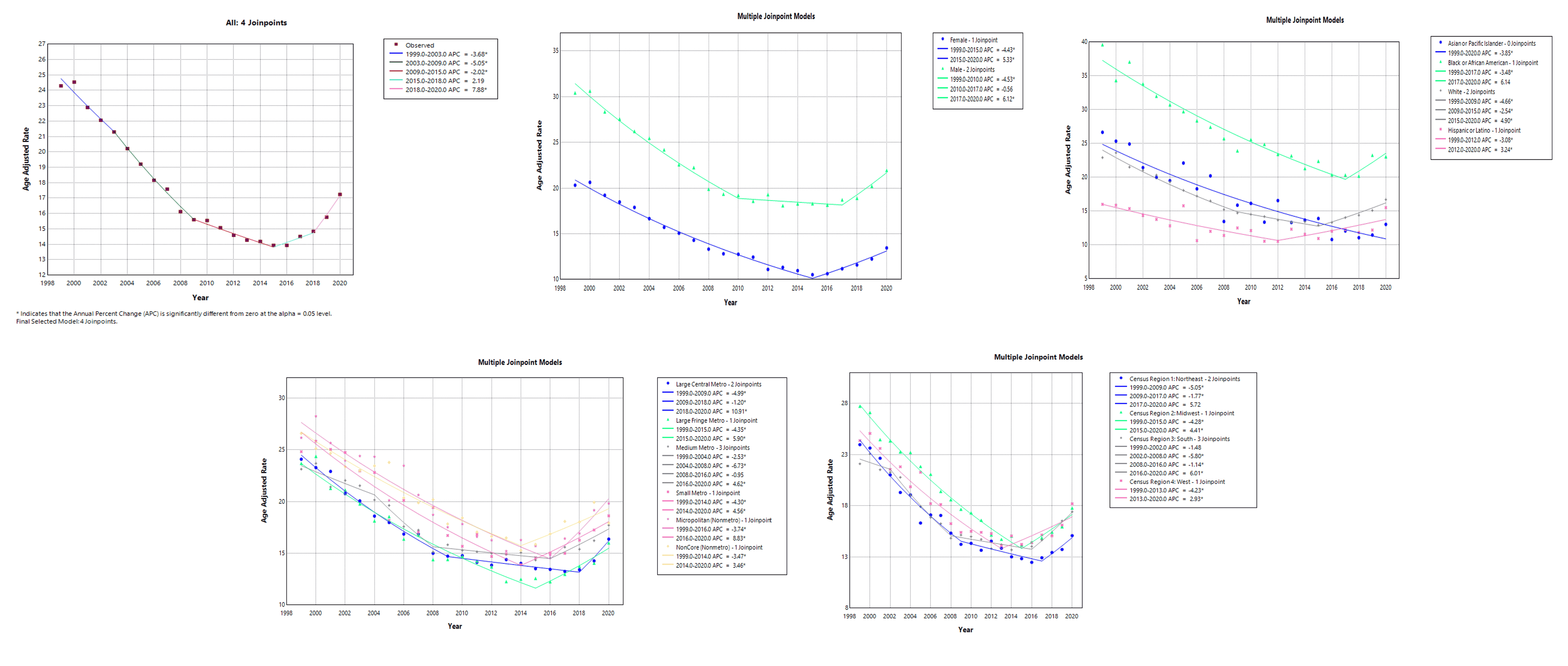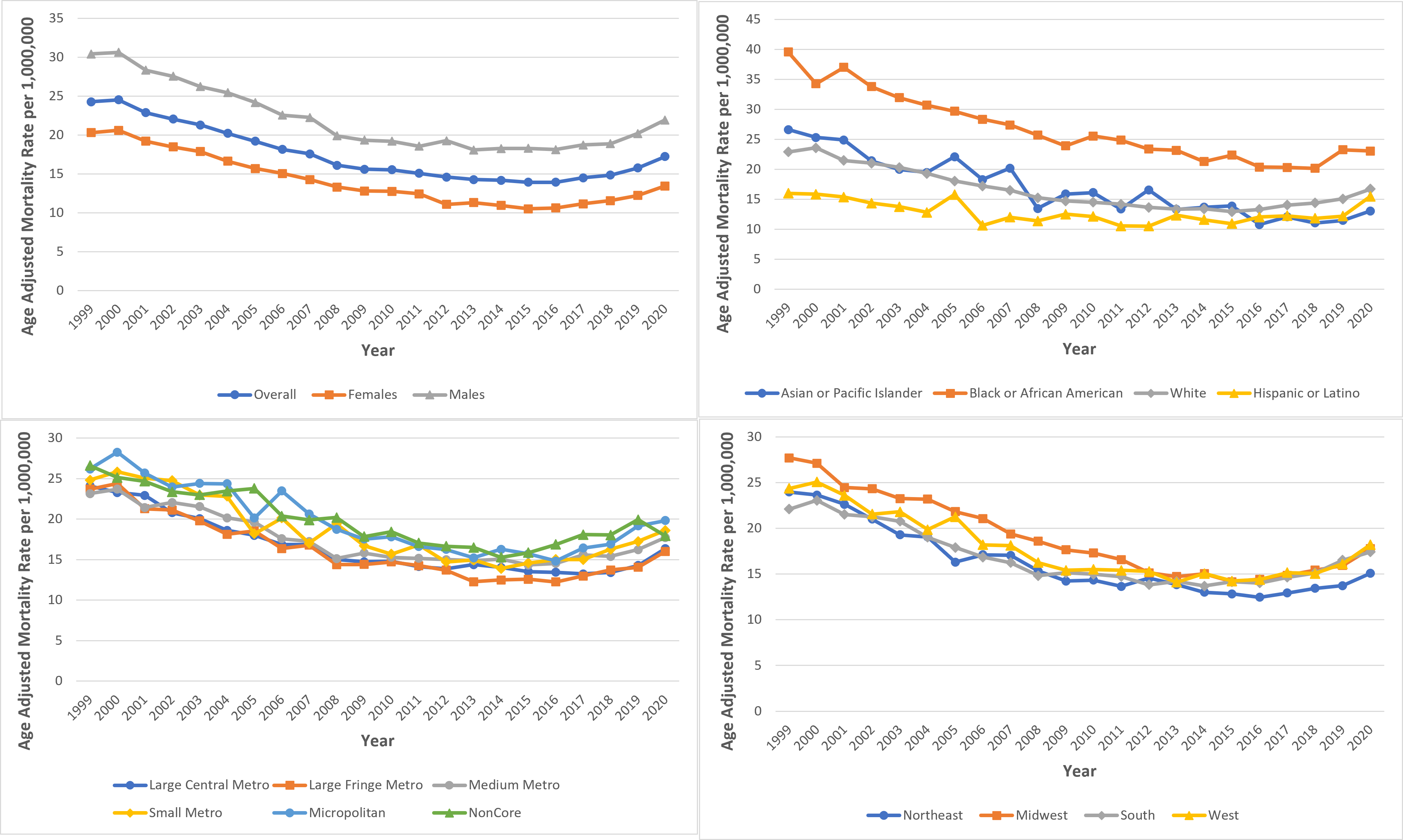Tuesday Poster Session
Category: Practice Management
P6165 - Rising Cerebrovascular Disease-Related Mortality and Healthcare Disparities Among Patients With Gastrointestinal Malignancies in the United States (1999-2020): A Population-Based Analysis
Tuesday, October 28, 2025
10:30 AM - 4:00 PM PDT
Location: Exhibit Hall
.jpg)
Muhammad Umer, MBBS (he/him/his)
King Edward Medical University
Bellmawr, NJ
Presenting Author(s)
Muhammad Ahmed, MD1, Muhammad Umer, MBBS2, Sarah Zaka, 3, Amir Hamza Khan, MBBS4, Ahmed Faizan, MBBS3, Faraz Iqbal. Khaskheli, 5, Misbah Bibi, MBBS6, Bismah Azam Ali, MBBS7
1Henry Ford Health, Clinton Township, MI; 2King Edward Medical University, Bellmawr, NJ; 3Allama Iqbal Medical College, Lahore, Punjab, Pakistan; 4Shifa College of Medicine, Islamabad, Islamabad, Pakistan; 5Liaquat University of Medical and Health Science, Karachi, Sindh, Pakistan; 6Bahria University Health Sciences Campus, Karachi, Sindh, Pakistan; 7Dow University of Health Sciences, Karachi, Sindh, Pakistan
Introduction: Malignant neoplasm of the digestive tract is one of the major contributors to cancer related deaths in the United States. The burden of cerebrovascular diseases in these patients remains rather understudied despite potential links through inflammation, treatment effects and shared risk factors. This study analyses the national mortality trends using the CDC Wonder Data Base to identify at risk groups and guide public health strategies.
Methods: We conducted a retrospective cohort analysis of mortality data for adults with cerebrovascular disease with digestive tract malignancies using the Centers for Disease Control and Prevention Wide-Ranging Online Data for Epidemiologic Research (CDC wonder) database from 1999 to 2020. These data are produced by the national center for health statistics.ICD-10 codes (CVD: I60-I69; GIT malignancy: C15-C26). Age- adjusted mortality (AAMR) and Annual Percentage Change (APC) were calculated using the Join Point regression program.
Results: Between 1999 and 2019, 81,958 cerebrovascular disease (CVD)-related deaths among patients with gastrointestinal malignancy were reported. The overall AAMR from 1999 to 2020 initially declined, then rose, reaching 17.2 per 1,000,000 in 2020. Males had higher mortality than females (AAMR: 21.9 vs. 13.4). By race, non-Hispanic (NH) Black individuals had the highest mortality (AAMR: 23.0), followed by White (16.7) and Hispanic (15.5) populations. AAMR varied by region; the Midwest (17.8) and South (17.4) had the highest rates, and rural noncore areas had the highest urbanization-specific rate (17.9). A reversal in trend was observed across nearly all subgroups post-2015. Join point analysis showed significant APC increases in males (6.12%), Black individuals (6.14%), micropolitan regions (8.83%), rural noncore areas (3.46%), and the South (6.01%) (p < 0.05).
Discussion: Our analysis reveals a concerning rise in cerebrovascular disease-related mortality among patients with gastrointestinal malignancies in recent years, particularly following 2015. This upward trend is especially pronounced among males, Black individuals, and residents of micropolitan and rural regions. These findings underscore widening healthcare disparities in this vulnerable population. Targeted efforts to improve cerebrovascular risk assessment, prevention, and management in patients with GI cancers are urgently needed to address these emerging trends.

Figure: Figure. Trends in cerebrovascular disease-related mortality among patients with gastrointestinal malignancies in the United States (1999–2020), stratified by sex, race/ethnicity, U.S. Census region, and urbanization level. Join point regression analysis depicting age-adjusted mortality rates (AAMR) and annual percent change (APC) across subgroups

Figure: Figure. Trends in cerebrovascular disease-related mortality among patients with gastrointestinal malignancies in the United States (1999–2020), stratified by sex, race/ethnicity, urbanization level, and U.S. Census region.
Disclosures:
Muhammad Ahmed indicated no relevant financial relationships.
Muhammad Umer indicated no relevant financial relationships.
Sarah Zaka indicated no relevant financial relationships.
Amir Hamza Khan indicated no relevant financial relationships.
Ahmed Faizan indicated no relevant financial relationships.
Faraz Khaskheli indicated no relevant financial relationships.
Misbah Bibi indicated no relevant financial relationships.
Bismah Azam Ali indicated no relevant financial relationships.
Muhammad Ahmed, MD1, Muhammad Umer, MBBS2, Sarah Zaka, 3, Amir Hamza Khan, MBBS4, Ahmed Faizan, MBBS3, Faraz Iqbal. Khaskheli, 5, Misbah Bibi, MBBS6, Bismah Azam Ali, MBBS7. P6165 - Rising Cerebrovascular Disease-Related Mortality and Healthcare Disparities Among Patients With Gastrointestinal Malignancies in the United States (1999-2020): A Population-Based Analysis, ACG 2025 Annual Scientific Meeting Abstracts. Phoenix, AZ: American College of Gastroenterology.
1Henry Ford Health, Clinton Township, MI; 2King Edward Medical University, Bellmawr, NJ; 3Allama Iqbal Medical College, Lahore, Punjab, Pakistan; 4Shifa College of Medicine, Islamabad, Islamabad, Pakistan; 5Liaquat University of Medical and Health Science, Karachi, Sindh, Pakistan; 6Bahria University Health Sciences Campus, Karachi, Sindh, Pakistan; 7Dow University of Health Sciences, Karachi, Sindh, Pakistan
Introduction: Malignant neoplasm of the digestive tract is one of the major contributors to cancer related deaths in the United States. The burden of cerebrovascular diseases in these patients remains rather understudied despite potential links through inflammation, treatment effects and shared risk factors. This study analyses the national mortality trends using the CDC Wonder Data Base to identify at risk groups and guide public health strategies.
Methods: We conducted a retrospective cohort analysis of mortality data for adults with cerebrovascular disease with digestive tract malignancies using the Centers for Disease Control and Prevention Wide-Ranging Online Data for Epidemiologic Research (CDC wonder) database from 1999 to 2020. These data are produced by the national center for health statistics.ICD-10 codes (CVD: I60-I69; GIT malignancy: C15-C26). Age- adjusted mortality (AAMR) and Annual Percentage Change (APC) were calculated using the Join Point regression program.
Results: Between 1999 and 2019, 81,958 cerebrovascular disease (CVD)-related deaths among patients with gastrointestinal malignancy were reported. The overall AAMR from 1999 to 2020 initially declined, then rose, reaching 17.2 per 1,000,000 in 2020. Males had higher mortality than females (AAMR: 21.9 vs. 13.4). By race, non-Hispanic (NH) Black individuals had the highest mortality (AAMR: 23.0), followed by White (16.7) and Hispanic (15.5) populations. AAMR varied by region; the Midwest (17.8) and South (17.4) had the highest rates, and rural noncore areas had the highest urbanization-specific rate (17.9). A reversal in trend was observed across nearly all subgroups post-2015. Join point analysis showed significant APC increases in males (6.12%), Black individuals (6.14%), micropolitan regions (8.83%), rural noncore areas (3.46%), and the South (6.01%) (p < 0.05).
Discussion: Our analysis reveals a concerning rise in cerebrovascular disease-related mortality among patients with gastrointestinal malignancies in recent years, particularly following 2015. This upward trend is especially pronounced among males, Black individuals, and residents of micropolitan and rural regions. These findings underscore widening healthcare disparities in this vulnerable population. Targeted efforts to improve cerebrovascular risk assessment, prevention, and management in patients with GI cancers are urgently needed to address these emerging trends.

Figure: Figure. Trends in cerebrovascular disease-related mortality among patients with gastrointestinal malignancies in the United States (1999–2020), stratified by sex, race/ethnicity, U.S. Census region, and urbanization level. Join point regression analysis depicting age-adjusted mortality rates (AAMR) and annual percent change (APC) across subgroups

Figure: Figure. Trends in cerebrovascular disease-related mortality among patients with gastrointestinal malignancies in the United States (1999–2020), stratified by sex, race/ethnicity, urbanization level, and U.S. Census region.
Disclosures:
Muhammad Ahmed indicated no relevant financial relationships.
Muhammad Umer indicated no relevant financial relationships.
Sarah Zaka indicated no relevant financial relationships.
Amir Hamza Khan indicated no relevant financial relationships.
Ahmed Faizan indicated no relevant financial relationships.
Faraz Khaskheli indicated no relevant financial relationships.
Misbah Bibi indicated no relevant financial relationships.
Bismah Azam Ali indicated no relevant financial relationships.
Muhammad Ahmed, MD1, Muhammad Umer, MBBS2, Sarah Zaka, 3, Amir Hamza Khan, MBBS4, Ahmed Faizan, MBBS3, Faraz Iqbal. Khaskheli, 5, Misbah Bibi, MBBS6, Bismah Azam Ali, MBBS7. P6165 - Rising Cerebrovascular Disease-Related Mortality and Healthcare Disparities Among Patients With Gastrointestinal Malignancies in the United States (1999-2020): A Population-Based Analysis, ACG 2025 Annual Scientific Meeting Abstracts. Phoenix, AZ: American College of Gastroenterology.
